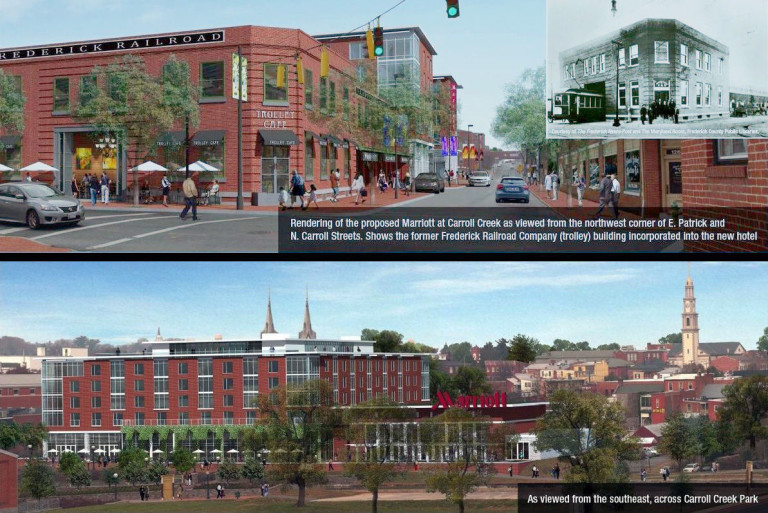
By: Carly Berkowitz
Advocates for the downtown Frederick hotel and conference center are hoping for the passage of a bill that would approve certain state funding for the project.
The bill would authorize the Maryland Stadium Authority to issue bonds and use the proceeds from the sale of the bonds to help pay for the public infrastructure of the conference center.
“Our goal is to get some kind of funding from the state this year so we can get some kind of state commitment and move the project forward,” said Delegate Carol Krimm, representative of District 3A and sponsor for the bill.
The state funding would be a part of a public-private partnership, and would be in addition to funds supplied through Plamondon Hospitality Partners, the development company.
The conference center itself will draw in the business of companies seeking to make use of meeting places for cooperate events and gatherings which is currently lacking in the area.
The drive for a hotel and conference center in the downtown Frederick area comes from a desire to keep business within county lines.
“They were going out of county because they didn’t have the facilities locally,” Krimm explained. “There would be a lot of increased business.”
According to Krimm, the project looks to increase state revenue alone by $1.5 million per year, and will not cost local citizens anything immediately out of pocket.
According the downtown hotel supporting website, no tax money collected on personal property from the citizens or businesses of Frederick other than the money generated by the project itself will be used for the project.
The bill aims to establish the state government as a partner to the local government in support of this project.
The biggest opposition to this project comes from Randy Cohen, the owner of the Francis Scott Key Holiday Inn, who supports a competing project to expand his own hotel to include a conference center. He is currently lobbying against the bill.
Cohen abstained from making a statement, but directed commentary to Peter Samuel, economics writer and interested third party.
According to Samuel, the project is too slow moving and not economically viable.
“This was a project essentially sponsored by a bunch of people who want to spend other people’s money,” Samuel said.
Samuel claims that the area would need to undergo traffic studies as well due to the already narrow and complex streets downtown, wasting more time in development.
Moreover, Samuel said that the size of the hotel is unreasonable for the area, and it requires the demolition of the historic Birely Tannery, which will cause friction with the Historic Preservation Commission.
“It’s kind of jammed into the site,” Samuel said. “Its size alone will cause it all kinds of grief when it goes before the Historic Preservation Commission.”
Supporters of the downtown hotel project believe that the revitalization of the area downtown will also inspire other progressive ventures throughout Frederick.
“It always starts with a big project and others follow,” Krimm said. “Once a project like this starts in a section of a city, it fuels development in that corridor.”
The City of Frederick and the Chamber of Commerce are currently in support of the project, as well as other areas of local government.
Historic preservation will also be taken into consideration as the project develops, as downtown Frederick is considered a historic area.
“The project would have to go through the Historic Preservation Commission,” Krimm said. “We’re not going to jump over any requirements.”
The end goal for this legislation would be to make the state full partners in the development of this project, and would lead to a commitment by the state to some funding.
According to Krimm, the initial commitment could lead to further assistance down the road, but the first step is required.
“Once you have that one commitment you can get future state dollars but you have to have the initial commitment,” Krimm said.
Krimm has been personally invested in this project for over six years and hopes to see the legislation through to the end.
Most recently, the bill had a hearing on March 8, but to date is still undecided.
Upon passage of the legislation, the next step of the project would be to start the process rolling in Frederick which includes the planning, zoning, and consideration by the Historical Preservation Commission.
Krimm said that the bill is very time sensitive, and that the future of the project hinges on its passing.